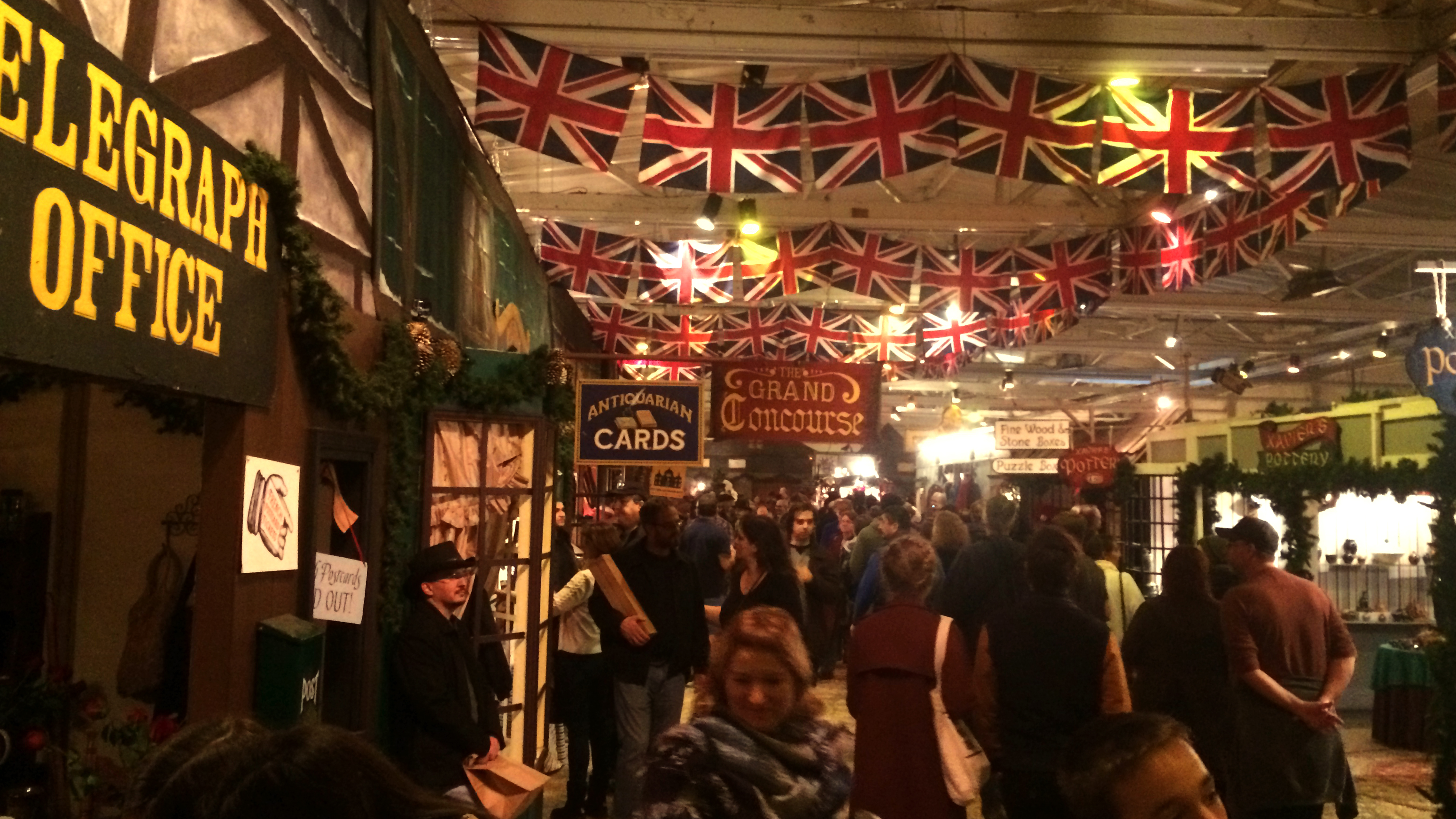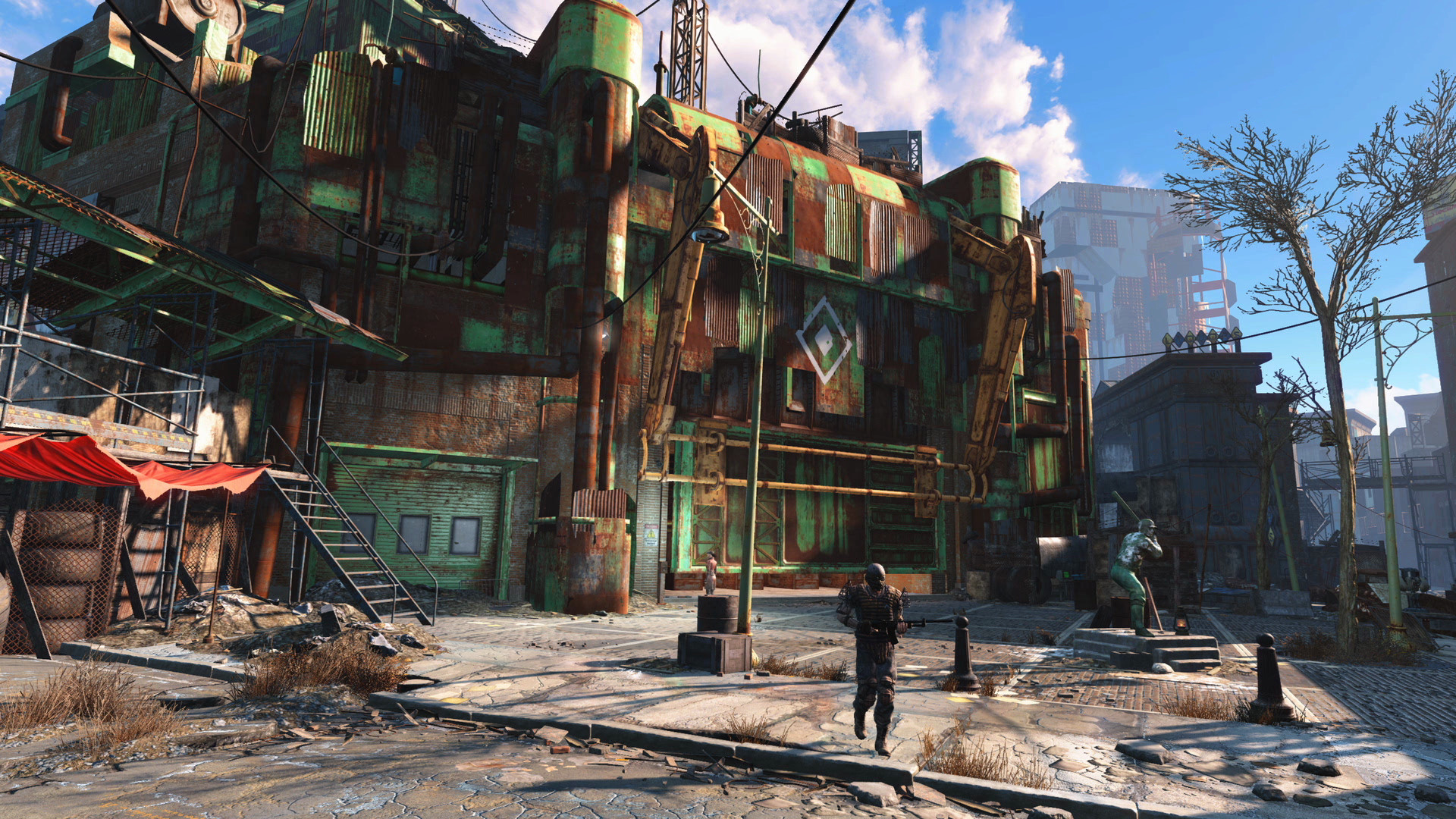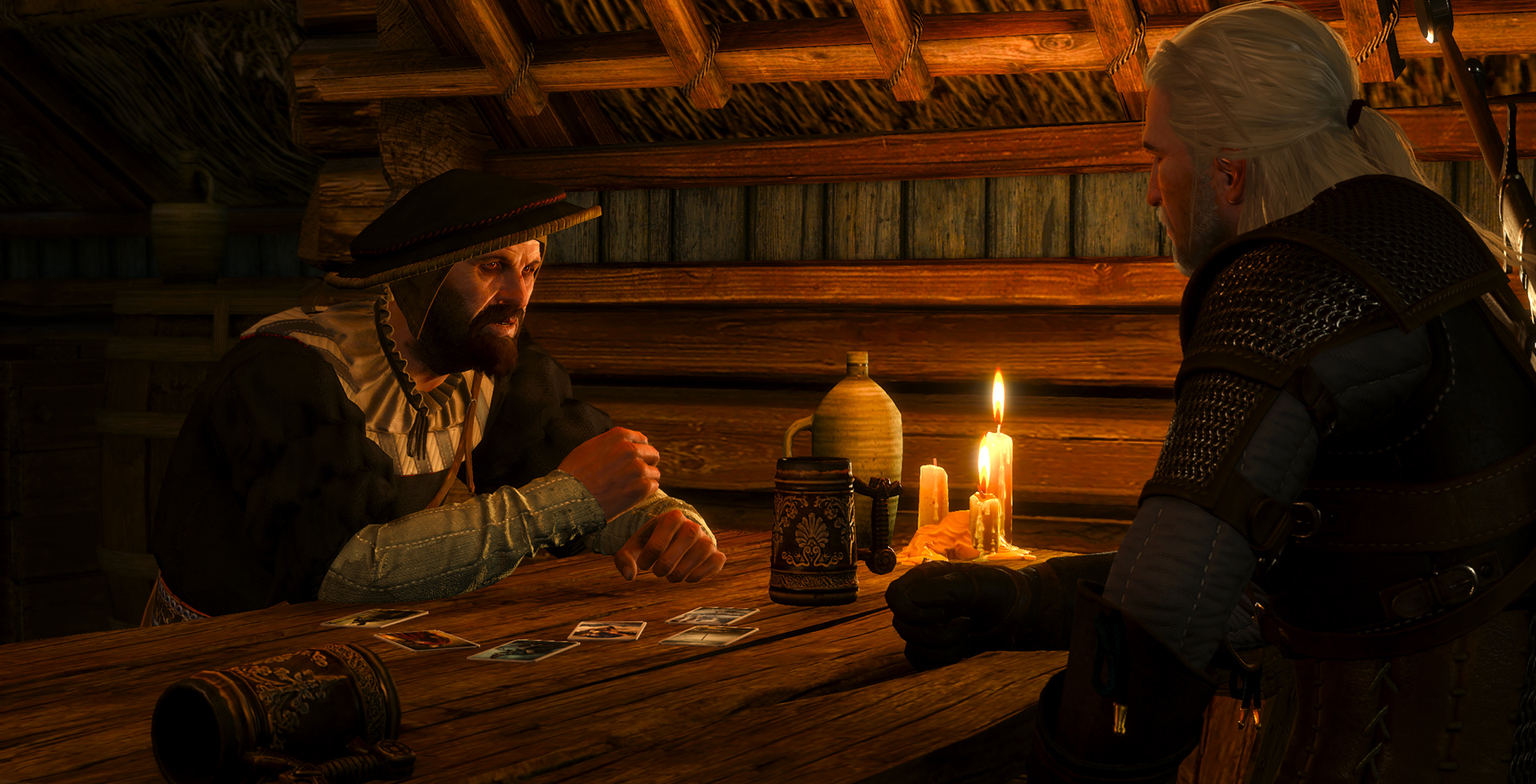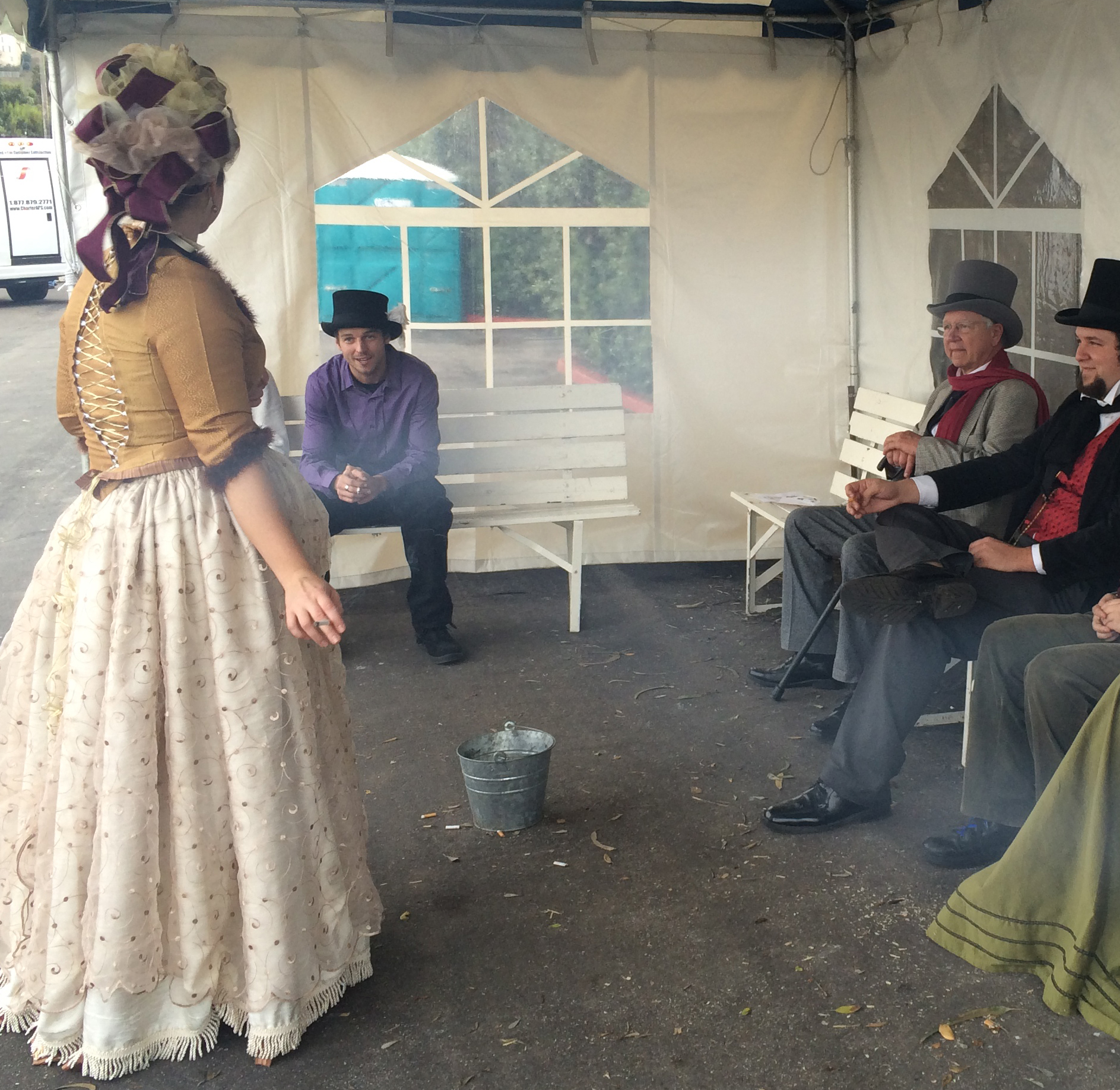What RPG towns can learn from a day at the Dickens Fair

Every year near the start of December the exhibition halls at the Cow Palace (an imposing Daly City complex originally built for livestock expos, and really called that) are filled with faux Victorian bars and shops, large bearded men singing sea shanties, elaborate dresses and corsets, fake English accents, fake drunks fake passed out on a light dusting of straw, and me, teetering down my fifth beer, splashing it on my anachronistic polka dot sweater as I try to point out Father Christmas to someone who wandered away five minutes ago. Ah, it’s the Great Dickens Christmas Fair, a holiday classic!
I’ve been to the Bay Area’s yearly fair twice, and while there’s a lot of production to its recreation of Charles Dickens’ London—musicians, dancers, wandering characters, shops and booze, meat pies and some excellent whiskey cakes—after a couple hours you’ve really seen it all. The theatre flats draped with garlands all start to look the same, and the shops don’t get any more interesting, unless cravats from the haberdashery are part of your sartorial experience.
This year, though, I stayed for five hours of drinking and merriment. I watched the same costumes and characters circle the enclosed city again and again, like live-action NPCs. It was a lot like being the main character of an RPG: an outsider in a town built to cater to outsiders, where the residents perform a Truman Show-style deception in pretending this facade actually meets the needs of a real population. They wander around pointing things out just for me. “Oh, there’s Ebenezer Scrooge, and there’s the Ghost of Christmas Past,” a stranger explains. “What’s this? Steampunk?” says a teenager in line for fish and chips as a man dressed like a Victorian Ghostbuster trundles past for the third time. Everyone is surprised by everything. The shopkeepers push trinkets, toys, nightlights, and hand-made brooms, but none of them ever actually go to each other’s shops. It's a city in perpetual motion, apparently sustained by nothing and going nowhere.

Fallout 4’s Diamond City has the same feeling. It purports to have a population but seems mostly to be a collection of shopkeepers who sell their junk to me and me alone. It’s small, and once you know where something is you just go there—at the Dickens Fair, it’s a mental map of the bars and toilets—and after an hour any sense of discovery tapers off. I get it, you’re the shopkeep who hates synths. And you can cut my hair. Happy to be your one and only customer. Happy to fund this entire city.
Diamond City is boring, and that's a problem for me (perhaps mitigated by player run settlements, but I haven't gotten to building one up). Towns and cities are my favorite parts of RPGs, and I’ve always wanted to really role-play someone who belongs to one of these places. In the early 2000s, I spent a lot of time hanging out in Everquest’s Freeport, imagining what sort of life a dwarf might have there, but not really living it. Much later on, I tried to wring everything I could out of Skyrim’s Whiterun, hanging out at The Bannered Mare listening to songs for as long as I could before boredom sent me on a quest. I try to get more out of these places than they're meant to give me, because I'm really supposed to be questing and fighting monsters and all that.
The best RPG place I’ve ever been was made of text. I used to play a MUD—a text-based MMO in modern terms—and at some point I’d leveled up more than I’d ever need to, so I just sat in one of my guild’s rooms and chatted and emoted, sometimes in character, sometimes out. We used items and cast spells for effect. We were the world’s flavor text, actors in the fair, especially when we messed with newbies. I miss that. I still think of it as a place I went, and I can still picture the red curtains in my usual hangout, even if it was all text. I went there just to be there, and that's a hard sort of place to find in a game.


Costumed attendees take a break at last year's Dickens Fair.
Text as a means for virtual reality is powerful because it’s so malleable. We could change the room descriptions, we could teleport, we could punch each other, we could bring a smurf to the guild and let it wander around. It's about interacting in little ways to feel like you belong, and I find that so much more fun than being a perennial outsider. I got a Dreamcast for Shenmue not because I wanted to fight, but because I heard you could play arcade games in the game. I think The Witcher 3’s card game, Gwent, is a very artful inclusion: playing cards is the sort of social interaction you can simulate when making conversation is so hard (I haven’t met any NPCs who can pass the Turing Test just yet), and it gives Geralt and the player a reason to stick around and be a part of the setting. And of course I made Commander Shepard dance at Mass Effect’s clubs and get hammered on batarian ale. I loved establishing a Shepard who takes part in the galaxy she lives in, even if I was just watching her awkwardly wobble around.
Keep up to date with the most important stories and the best deals, as picked by the PC Gamer team.
In that vein, and because I couldn’t take five hours of circling a livestock hall, my party and I claimed a corner of an absinthe bar and blended in like animatronic patrons, focusing on drinking, clinking our plastic cups, and laughing boisterously. I started as an outsider and ended the night with a top hat on my head drinking ginger beer and rum, a drunk fake-Londoner at home. “‘Ello govna,” I probably said too much, knowing full well that “hallo” would be the correct greeting. But who’s keeping score?
The people having the most fun at the Dickens Fair are the ones in costume, not the outsiders they’re playing it up for. I didn’t dress up, but with rum and company and a bad accent, I made a corner of it mine. A virtual reality is built with all the little interactions that make up life, and it’s when games stop explaining everything and start treating me like a resident of the world that I get into them. Let me drink, play cards, and dance, because I can only watch a Victorian Ghostbuster stomp around in circles for so long before I'm headed for the rum.

Tyler grew up in Silicon Valley during the '80s and '90s, playing games like Zork and Arkanoid on early PCs. He was later captivated by Myst, SimCity, Civilization, Command & Conquer, all the shooters they call "boomer shooters" now, and PS1 classic Bushido Blade (that's right: he had Bleem!). Tyler joined PC Gamer in 2011, and today he's focused on the site's news coverage. His hobbies include amateur boxing and adding to his 1,200-plus hours in Rocket League.

